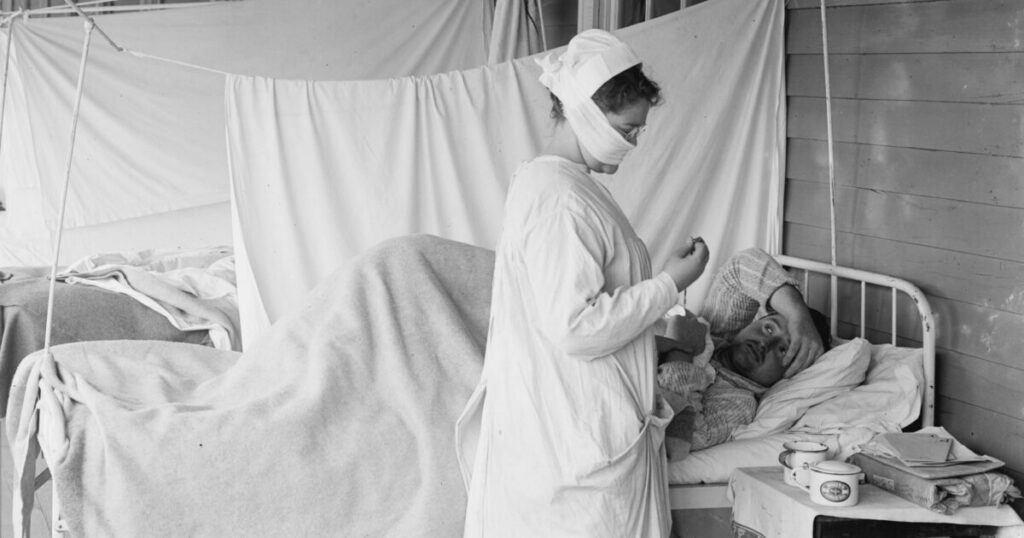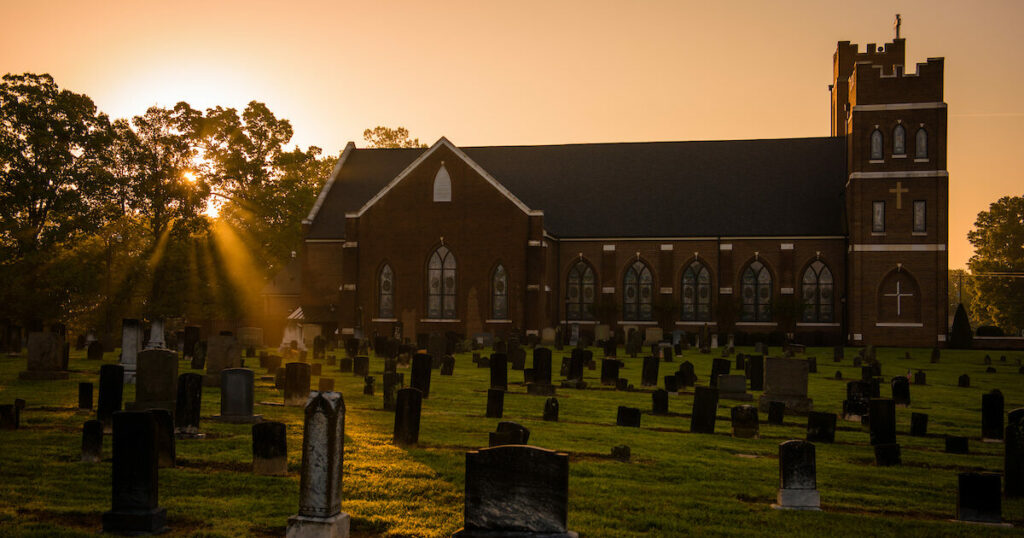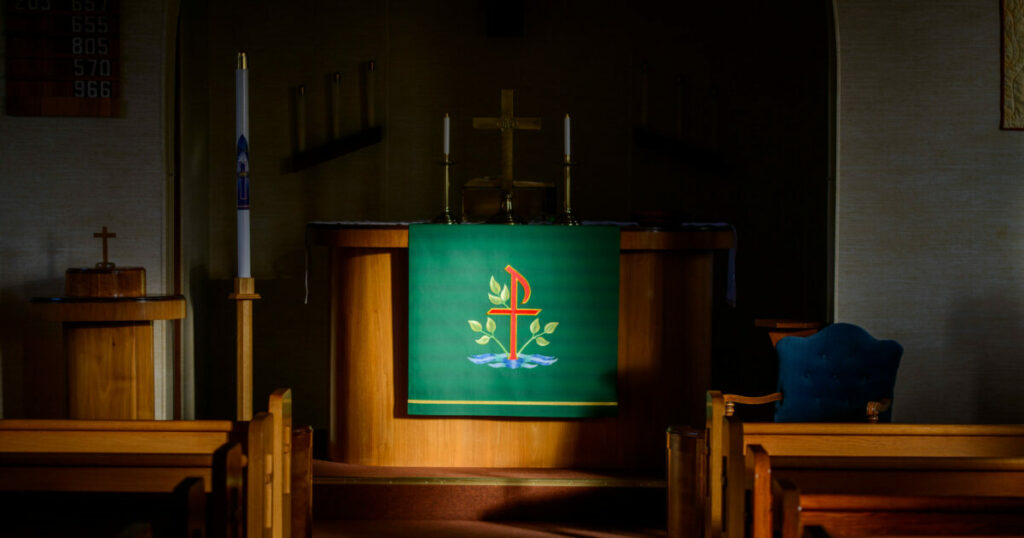by Lawrence R. Rast Jr.
“The production of natural resources is crippled … Business is suffering; places of amusement, schools, even the churches are closed in many and large sections, and the fear of death is tormenting many.”[1] As contemporary as this description sounds, it actually appeared in The Lutheran Witness of Oct. 29, 1918. The author of the article, simply titled “The Epidemic,” was Pastor Richard Jesse, who believed the coming of the Spanish flu was God’s means to drive people to repentance. The epidemic was, in his mind, “another scourge of the Almighty.”
Devastating diseases have been a part of the human experience since the fall of human beings into sin, with its disastrous effects on God’s good creation. The current COVID-19 pandemic has disrupted our lives and thrown our ordinary routines, including our churchly ones, into complete chaos. Is this “another scourge” from God? How can we make sense of these times? How has the church reacted in the past, and how should we react today?
Investing contemporary events with theological meaning is always risky business, but it is also a natural thing for us to do. Apart from a specific biblical word such efforts always remain interpretations, but all of us engage in them. And we Lutherans have consistently done so, as both the words of Jesse above and the following stories show.
A devastating epidemic of yellow fever broke out in Philadelphia in 1793. Philadelphia at the time was the temporary capital of the United States and the largest city in the country. Its population of about 50,000 decreased by at least 8% over the course of the epidemic (Aug. 1 to Nov. 9, 1793). Among the 4,031 people buried during the epidemic, 641 (16%) of them were from the Lutheran congregation served by J.H.C. Helmuth (1745–1825).
Helmuth’s account of the epidemic, published as A Short Account of the Yellow Fever in Philadelphia for the Reflecting Christian (trans. Charles Erdman, 1794), offers insight into how Christians struggled with the sudden appearance of a sickness that they lacked the ability to understand. Its descriptions sound hauntingly contemporary at times: “The external appearance moreover of those who met one another in the street, increased the alarm. They generally had spunges or handkerchiefs before their mouths and noses, and some even had the mouth entirely covered. They shunned each other through fear of being infected.”[2]
Because they did not understand the cause of the fever, people struggled to determine the best ways to protect themselves and the larger community. Those who had the means simply deserted the city; upwards of a third of the population pursued this avenue — including President George Washington. Those who remained and took sick were treated generally by bleeding. Needless to say, such treatments hurt more than they helped. What was more beneficial were the efforts to decontaminate houses and to clean the particularly filthy areas of the city. Later, Philadelphia passed quarantine laws and posted guards at the city’s borders to deny entry to citizens of other towns and cities that were experiencing the fever.
Among the most controversial of Helmuth’s actions was continuing to hold services, which may have increased the death toll among the Lutherans. At the same time, Helmuth did so out of his conviction that “the Lord brought all this dying to our town. He makes no differences in his punishment.”[3] The real cause of the epidemic, in Helmuth’s opinion, was the corporate sinfulness of Philadelphia as a whole as manifested in the sinfulness of its individual citizens. Drinking, cursing, sabbath breaking and attending the theater were all pursuits that continued in the midst of the plague. And such activities invited the wrath of God. How then, asked Helmuth, could the church possibly refrain from gathering and turning the people from their sins to a life that God could bless?
With the cooler autumn weather of 1793, the epidemic released its grip. It returned, however, almost annually, with another especially destructive outbreak in 1798. And through the years it seemed that God continued regularly to send “another scourge” upon the people of the United States. Years later, in 1918, when an epidemic of the Spanish flu had devastating effects throughout the world, one of the hardest hit cities was Philadelphia, which did little to mitigate the impact of the flu.
Other cities did address the problem, including the imposition of what were broadly called “Churchless Sundays.” St. Louis closed the churches for one Sunday, Oct. 13, 1918. J.H.C. Fritz, chairman of the St. Louis Pastoral Conference and later professor at Concordia Seminary, noted that it was “customary among Lutherans to have family worship,” and he recommended that “the ‘lessons for the day’ be read from the Bible in lieu of the church service.”[4] In other places government directives extended these over several Sundays. What could be done in a world with no opportunity for livestreaming or video delivery of sermons? In Knoxville, Tenn., the Rev. K. Kretschmar encouraged his flock to have family devotions so that Sundays, “though church-less,” might be “God-full.”[5]
Our Synod was affected by the pandemic. At least 19 pastors and three teachers died of the flu. Both seminaries closed and one student, H. Kern, died at the St. Louis seminary. Several district conventions were postponed or shortened. And yet, in time, the pandemic passed, and we were able to gather together once more around pulpit, font and altar.
In the midst of the pandemic, there was profound uncertainty and anxiety, not unlike that of 1793 — and 2020. By late September 1793, Pastor Helmuth nearly despaired as he wrote in his journal: “The sickness and death are all around us. Lord Jesus, help us. Do not leave us alone.” Jesus does not abandon us, especially in uncertain times. For we are His church, and as the dearly beloved children of God, we have His promise never to leave us or forsake us.
While it seems that we must endure “another scourge,” in truth we know that God works all things together for the good of those who love Him (Rom. 8:28). That is His promise to you and me — to us as The Lutheran Church—Missouri Synod. Truly, it seems to be the case that the issue of gathering together in our congregations is more on the minds of our Synod than it has been in years. While we may have taken this blessing for granted, we don’t any longer. Now, as we anguish over being separated from one another, this leads us to look forward to that time when we gather together around the Word and Sacraments. At the same time, we see the Scripture being shared over social media as never before. Christ is being proclaimed. In the midst of challenge, there is an opportunity to confess God’s faithfulness, to serve our neighbors in their bodily and spiritual needs, and to reach out to them with the Good News of Christ’s death and resurrection. As we do so, we must act wisely in the midst of the present uncertainties. In all things, we trust in God’s unwavering promise to us: “And behold, I am with you always, to the end of the age” (Matt. 28:20).
The Rev. Dr. Lawrence R. Rast Jr. is president of Concordia Theological Seminary, Fort Wayne.
This article originally appeared in print in the June/July 2020 issue of The Lutheran Witness.
[1] “The Epidemic,” The Lutheran Witness 37 (1918): 339.
[2] Helmuth, Yellow Fever, 40.
[3] “Rev. Helmuth’s Diary,” 3 November 1793, bobarnebeck.com/helmuth.html, accessed April 19, 2020.
[4] “Churchless Sundays Will Be Observed Because of Plague,” St. Louis Globe-Democrat, Oct. 12, 1918.
[5] “Revive Worship Sunday in Home,” Knoxville Sentinel, Oct. 19, 1918.






In this World of uncertainty, know this that God is in control. Psalm 11:3-4 says ” When all that is good falls apart, what can good people do?” The Lord is in his Holy Temple; the Lord sits on his Throne in Heaven. He sees what people do; he keeps his eye on them. So you can be assured that no deadly diseases or danger comes God is not in control. Read Psalms 91 Safe in the Lord. He is all the protection we need.
Amen
“Letter to the Editor”
As I read “Another Scourge” I kept going to the catechism … parts of the creed “he defends me against all danger …” … “has redeemed me … that I may be his own…” …”gives eternal life to me …” The Lord’s Prayer … “daily bread … deliver us from evil …” and the commandments … “fear, love and trust in God above all things … call upon it (His name) in every trouble, pray, praise and give thanks.” As the Rev. Dr. Rast reminds us, that our world is sinful, but we can live in the joy of God’s redeeming love each day.
Ben Barth
Clinton, Illinois
This is my 1st experience with a pandemic. It does not affect me too much as I am retired and live alone. I do wonder when God will end this pandemic. Will He finally decide that He has had enough and blow the trumpet and call all believers home?
Come quickly, Lord Jesus. Come quickly.